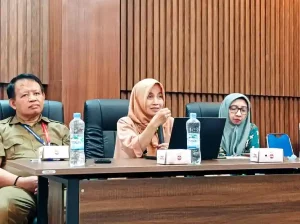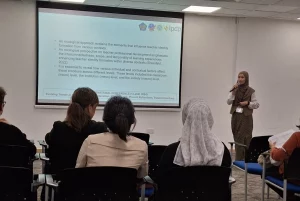UNAIRNEWS – The Faculty of Economics and Business (FEB) Universitas Airlangga (UNAIR) hosted a national seminar on Indonesia’s Developments and Strategies in International Trade Negotiations. Held on Friday, October 4, 2024, at the Fadjar Notonegoro Auditorium on the Dharmawangsa-B Campus, the event featured leading academics discussing Indonesia’s role in international trade negotiations and its future strategies.
Prof. Dr. Dian Agustia, SE, M.Si, Ak, CMA, CA, Dean of FEB UNAIR, delivered the opening remarks, stressing the significance of the seminar in shaping Indonesia’s economic trajectory. She also emphasized the importance of collaboration between academic institutions and the government in addressing key economic challenges.
Prof. Agustia pointed out that the seminar would provide students with valuable insights into national trade strategies. “As a nation with vast economic potential, discussions like these are critical to understanding the evolving dynamics of trade negotiation strategies,” she said.
Achievements and challenges
In his keynote speech, Djatmiko Bris Witjaksono, SE, MSIE, Director General of International Trade Negotiations at the Ministry of Trade, addressed Indonesia’s progress and the challenges it faces in the global trade arena. He highlighted the pressure from major economies that seek to maintain their dominance through trade agreements, which often favor developed countries.
“Large countries frequently impose standards that are difficult for developing nations like Indonesia to meet, particularly on environmental and labor issues,” Witjaksono explained.
Additionally, the rising trend of protectionism presents a serious challenge for Indonesia. Trade partner countries often implement protectionist policies that restrict access for Indonesian products in their markets. “Such protectionist measures harm developing countries by reducing exports and, consequently, impacting national economic growth,” he added

Strategic measures from the Ministry of Trade
As a solution, Witjaksono outlined the Ministry of Trade’s progressive steps. First, Indonesia seeks to strengthen its position in future trade agreements. “We ensure that Indonesia actively participates in all trade negotiations, whether bilateral or multilateral, to guarantee that national interests are well represented,” he explained.
Secondly, Indonesia has started prioritizing sustainability in trade negotiations. One of the main concerns is the stringent environmental standards imposed by developed countries, especially regarding carbon emission reduction. “Indonesia is proactively developing strategies that integrate environmental sustainability with trade interests, ensuring that our products remain competitive in the global market,” Witjaksono said.
Equally important, he stressed the need for stronger trade negotiations to promote Indonesia’s top products. “Strong and proactive negotiations are our key tools in trade discussions. The Ministry of Trade has intensified diplomatic efforts across various countries to ensure that Indonesia’s leading products gain better access to international markets,” he concluded.
Author: Sintya Alfafa
Editor: Edwin Fatahuddin









